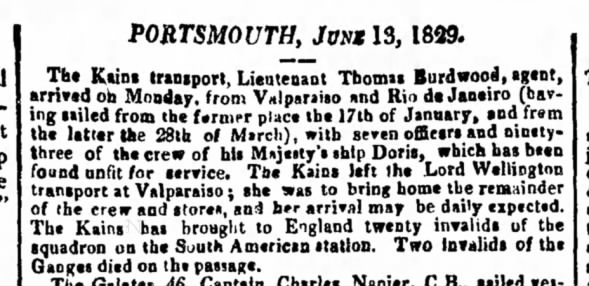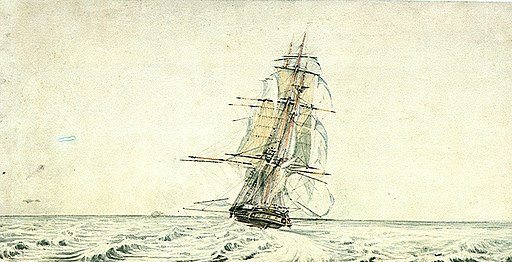Writing about Rio in volume 2 of Herman Melville: A Half Known Life, John Bryant finds subtle but nonetheless "grim" and even "gruesome" evidence of inurement to ongoing horrors of the Atlantic slave trade in one of Melville's earliest sources, A Visit to the South Seas by C. S. Stewart. Here is the relevant passage in Stewart's Visit, Letter 5 ("Description of the Bay of Rio de Janeiro"):
HMS Doris
1828, drawing by P. B. Watson
 |
"Before dark, two or three vessels, outward bound, passed us: one a transport ship from Valparaiso, having on board part of the crew of the British frigate Doris, lately condemned there. Lieutenant Griffith, of the royal navy, the officer in charge of them, paid a short visit to the Guerriere in his boat, and gave us some news from the capital." -- A Visit to the South Seas (New York, 1833) volume 1 page 40.
In a letter to his daughter in New York, he wrote that the Chilean ship had been "lately condemned there" and was now sailing with a crew that included former shipmates of the British frigate Doris. Stewart writes without bothering to explain what "condemned" means or why British sailors crew a Chilean Ship because his daughter, and other readers of his eventually published letters, knew from his three succinct words "lately condemned there" that the transport had once been a Chilean slave ship, that it had been captured by the British frigate Doris, that the mixed commission in Rio had "condemned" it, and that it was now repurposed and crewed by British sailors as their reward for seizing the slaver.-- John Bryant, Herman Melville: A Half Known Life Volume 2 (Wiley Blackwell, 2021) pages 791-792.
Fact Check
Bryant has wrongly identified the "transport ship from Valparaiso" as a Chilean slave ship. This imaginary slaver is assumed, again wrongly, to be the ship that according to Charles Samuel Stewart had been recently "condemned" at Valparaiso. However, as confirmed by naval records and multiple reports in contemporary newspapers, Stewart's expression "lately condemned" modifies "Doris" (the nearest antecedent) not "transport ship." In reality, the condemned ship was the British frigate Doris, deemed unseaworthy and
Brian Vale helpfully specifies why, in a book all about His Majesty's Ship Doris titled A Frigate of King George: Life and Duty on a British Man-of-war (I. B. Tauris, 2001). Decayed timbers, according to the paraphrase of Vale's final chapter on Wikipedia:"Sold at Valparaiso (for $5,590) because of her decayed state."-- Rif Winfield, British Warships in the Age of Sail, 1793–1817 (Pen & Sword Books, 2005).
More than one vessel was commissioned to bring home officers and crew of the condemned Doris. One such "transport ship" was the barque Lord Wellington:"By the late 1820s, decayed timbers in her bow made her unfit for further service, and she was sold at Valparaiso in April 1829."
The Lord Wellington arrived safely back in Portsmouth, England on the first Tuesday in July, as announced for example in the London Standard on July 13, 1829:"The following vessels of war were at Valparaiso 1st March... barque Lord Wellington, transport ship, for Rio Janeiro next day, having on board Sir John Sinclair, and a part of the officers and crew of the Doris frigate, condemned at Valparaiso."
13 Jul 1829, Mon The Standard (London, Greater London, England) Newspapers.com
On Tuesday last arrived the Lord Wellington transport, from Rio de Janeiro, from which she sailed on the 5th of May. This ship was commissioned by Captain Sir J. Gordon Sinclair, Bart., pursuant to orders, to bring home the officers and crew of the late ship Doris, whose very defective state would have rendered extremely hazardous a voyage in her round Cape Horn. A considerable quantity of her stores were brought away, and her hull hand been hauled on the beach at Valparaiso, where it would be sold...."PORTSMOUTH, JULY 11.
As reported in the "Monthly Naval Register," another transport ship, the Kains (alternatively rendered in newsprint as Hains and Kaius) also
"brought home a part of the officers and crew of H. M. late Frigate, Doris, and a number of invalids, from the South American Station."
-- The United Service Magazine, Volume 2 (London, 1829).
"The Kains transport, from Valparaiso, on her way home touched at Rio Janeiro. The above transport has on board the crew of the Doris frigate, which was condemned." --London Morning Post, June 11, 1829.
Aboard the Guerriere, C. S. Stewart was visited by "Lieutenant Griffith" of the outward bound transport ship "before dark" on Saturday, March 28, 1829 (Letter 5, Visit to the South Seas, vol. 1). The timing as reported by Stewart to his daughter perfectly matches the departure of the Kains transport, which sailed from Rio de Janeiro on "the 28th of March":

PORTSMOUTH, JUNE 13, 1829.
The Kains transport, Lieutenant Thomas Burdwood, agent, arrived on Monday, from Valparaiso and Rio de Janeiro (having sailed from the former place the 17th of January, and from the latter the 28th of March), with seven officers and ninety-three of the crew of his Majesty's ship Doris, which has been found unfit for service. The Kains left the Lord Wellington transport at Valparaiso; she was to bring home the remainder of the crew and stores, and her arrival may be daily expected. The Kains has brought to England twenty invalids of the squadron on the South American station. Two invalids of the Ganges died on the passage. --London Morning Chronicle, June 15, 1829.
By all accounts the Lord Wellington did not leave Rio until the 5th of May. So then, the outward bound "transport ship" sighted by Stewart on March 28, 1829 must have been the Kains. Homeward bound on the Kains, the visiting Lieutenant Griffith was one of the "seven officers" from the HMS Doris, lately "found unfit for service." As reported in the Hampshire Chronicle on June 15, 1829, the Kains transport "with Commander Rich. Griffith, some other officers, and about 100 of the crew of the Doris" arrived safely in Portsmouth on June 8th:
Portsmouth, Portsea, and Gosport. Saturday, June 13.
... Arrived, on Tuesday, the Kains transport, from Valparaiso, with Commander Rich. Griffith, some other officers, and about 100 of the crew of the Doris. Capt. Sir John Sinclair, Bart, and the rest of the officers and men were to follow in the Lord Wellington transport. The Kains sailed from Valparaiso the I8th Jan. and Rio Janeiro 28th March.
Bryant remarks that Stewart's mention of the "lately condemned" vessel is "unencumbered by outrage." No outrage? Does it matter the slave ship is made up, a fake? Maybe not to social justice wacktivists who equate silence with violence.
But Stewart was not that silent. Later in the same book (Letter 11 on "Prisons, Judiciary, Slave Trade") Stewart did in fact describe and condemn the "abhorrent and tremendous evil" of the slave trade conducted at Rio de Janeiro:
A glimpse at a still more abhorrent and tremendous evil was caught, in the same vicinity [near the city prison], while crossing the end of a street appropriated to newly arrived and unsold slaves. It is here the emaciated and half-starved cargoes are deposited from the stifling holds of the slave-ships, and daily exposed to brutal examination, till a purchaser is found. The sight is such, to an unaccustomed eye, as unavoidably to sicken the heart, and unnerve the soul; and hitherto, at the strong solicitation of others, I have avoided it.
Since Bryant notes Rev. Stewart's lack of "outrage" at the nearby specter of a fake Chilean slave ship, he probably should have mentioned Stewart's reaction to a real slave ship at sea, recorded in the third chapter of his Journal of A Residence in the Sandwich Islands (New York, 1828):-- Charles S. Stewart, A Visit to the South Seas in the U. S. Ship Vincennes Volume 1 (New York, 1831) pages 97-98.The number of slaves brought into this port has, for the last ten years, amounted to more than twenty thousand annually; and this year it is probable there will be three times that number, for no less than thirteen thousand have already been entered since the first of January. Ships are daily arriving, crowded with them; and almost at any time, gangs just landed, and nearly naked, may be seen, with their drivers, in one part or another of the city.
It was a Portuguese vessel, of very indifferent appearance. Our captain put the Thames so close alongside of her, that an apple could have been thrown on her deck. The commander could not speak English, and hailed through one of his crew. He merely wished to know our longitude; and informed us he was bound to the western coast of Africa. With the knowledge of her destination, the horrors of a slave ship at once rose on the mind; and the probability of her errand to that land of wretchedness, took entire possession of the imagination. The sighing of the captive, and the groaning of the oppressed, seemed already to be heard from her hatchways; and, as we dropped into her wake, gazing at her black hulk and bloody waist — colors well suited to her character — I could not add, to the farewell wave of the hand, the customary ejaculation, “God speed thee!"
Never before do I recollect to have been so deeply impressed with the enormity of this trade. I involuntarily shrunk from the sight of men who I believed to be engaged in its cruelties; and felt no inclination, as on similar occasions, to watch the lessening sail till it should sink beneath the horizon. Instead of impressions of beauty, before received from the same object, every look brought with it associations of human misery. Oh! what perversion of feeling, what destitution of principle, must there be in the heart that can, in the light of the present day, convert the ignorance and debasement of those who, though sunk below the level of their race, are still “bone of our bone and flesh of our flesh,” into reasons for subjecting them to still greater degradation! Surely, if anything on earth calls loudly for the righteous judgment of God, it is the prosecution of this trade; and sooner or later, the retributions of a just avenger must fall on those who thus make the heavens echo with the moanings of the bereaved, and the earth rich with the tears and blood of the enslaved.
https://books.google.com/books?id=fENNh2rtRyoC&pg=PA43&dq#v=onepage&q&f=false






